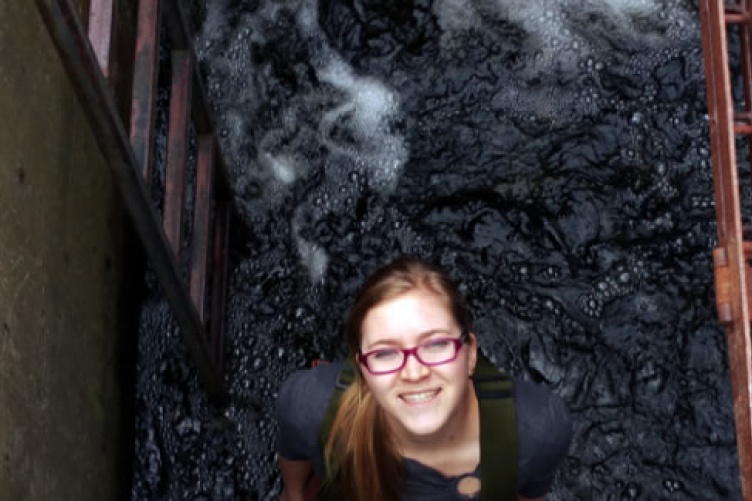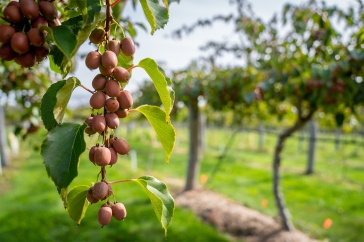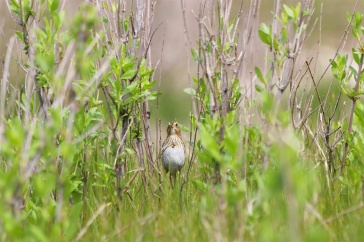
L to R: Amber Rebecca Kittle of Nashua, Emily Van Gulick of North Wales, Pennsylvania, and Shana Whitney of Goffstown.
After working side-by-side with their faculty mentors for years, the NH Agricultural Experiment Station at the University of New Hampshire celebrates 2017 graduates who have conducted experiment station-funded research. For some, graduate school is the next step; others will move on to their first jobs. For all, their experience working as a student researcher supported by the experiment station was meaningful, and sometimes, life changing.
Shana Whitney of Goffstown will receive a bachelor’s degree in environmental conservation studies. While at UNH, she worked with experiment station researcher Dr. Serita Frey, professor of natural resources and the environment. Whitney’s research focused on the growth of individually cultured fungal species exposed to varying temperatures and soil nitrogen availability. Specifically, she quantified respiration (CO2 flux) and microbial growth, and for the majority of her research, she was working on creating a protocol for constructing an artificial soil medium.
Whitney explains that an artificial soil medium was important to her research because it provided a sterilized environment that detected biomass and respiration solely from the fungal culture. This research was important in a broader sense because fungal growth rate and biomass are sensitive to environmental conditions. Understanding how these variables interact is important in understanding fungal communities’ impact on the storage of carbon and nutrient cycling in a system.
“Having the chance to do research during my undergraduate career was very fulfilling. Being able to pursue this kind of career path in my undergrad was a great way for me to figure out what I wanted to do after I graduate. Opportunities like this are really valuable for students because they get the chance to try new things in different fields and figure out what they're interested in. When research is included in a student's UNH experience, it allows them to understand how real-life research impacts what we learn in the classroom,” she said.
After graduation, Whitney will attend graduate school for a master’s in natural resources at UNH. Frey will be her advisor. “My experience with research definitely prepared me for what I'll be doing in graduate school. If I hadn't gotten the chance to work in a lab, work directly with graduate students, and do independent research, I don't think I would have thought that graduate school was an option for me. By working in an environment where I'm constantly learning about the process of graduate school, I figured out that furthering my education was not only a possibility for me, but also a goal,” she said.
Mary Barnovsky of Nashua will receive a bachelor’s in nutrition and wellness. She worked with experiment station researcher Dr. Lise Mahoney for more than three years. “I wanted to work in a greenhouse or on a farm, and the work Lise needed help with was exactly that. Even though I changed my major my junior year, I really enjoyed the work and found that strawberry research was important in the nutrition world,” Barnovsky said.
“Working with Lise allowed me to be prepared for the lab environment and made some of my more challenging classes easier,” said Barnovsky, who works for North Country Hard Cider. “North Country Hard Cider is preparing me for the food and beverage industry, which was one of my favorite topics in nutrition. I feel it is a great platform to help me grow and develop new skills. The skills I gathered from Lise over the years helped land a new job and start a new chapter of my life.”
Amber Rebecca Kittle of Nashua will receive a bachelor’s degree in sustainable agriculture and food systems, with an emphasis in soil ecology. Her experiment station mentor was Dr. Serita Frey; she has worked in the Frey Lab for nearly two years. Kittle researched the impacts of abiotic stressors such as temperature warming and nitrogen deposition on native tree fine roots. In addition to these stressors, she investigated the biotic stressor invasive plant garlic mustard as it has secondary compounds that suppress plant productivity.
“We have some understanding of the individual effects of these stressors on fine roots and soil health, but I was interested to understand the impact these stressors were able to make when combined. The natural environment is a complex system, and it is research projects like these that help us to break down and understand the impacts of climate change on our ever-changing world,” she said.
“This research experience gave me a place to fit in at UNH and feel as though I was able to make a difference using what I have learned in classes and while working in the Frey Lab,” said Kittle, who plans on seeking full-time employment after graduation.
Emily Van Gulick of North Wales, Pennsylvania, will receive a bachelor’s in marine, estuarine, and freshwater biology. Van Gulick studied with experiment station researcher Dr. Stacia Sower, professor emeritus of molecular, cellular, and biomedical sciences. Specifically, she worked in the Anadromous Fish and Aquatic Invertebrate Research Laboratory under Sower’s mentorship, investigating the neuroendocrine control of reproduction in the sea lamprey.
“My research has largely focused on studying and mapping the sea lamprey brain and its associated neurohormones. In addition to the lamprey’s evolutionary insights, the challenging and dynamic endocrine and nervous systems contributed to a rewarding research experience. I helped conduct experiments and analyze data that advanced the available information on hormonal interactions in the sea lamprey brain, which has applications in better understanding its reproductive system. I also contributed to a sea lamprey brain mapping initiative that will serve as a resource to experts and the general public. The diversity of topics, techniques, and responsibilities made every day a new learning experience and provided me with the opportunity to contribute to collaborative projects aimed at advancing scientific understanding with interdisciplinary applications,” Van Gulick said.
Following graduation, Van Gulick will work as a seasonal resource assistant with the Inland Fisheries Division of the Connecticut State Government. There she will assist with ecosystem-based management of fish populations of recreational significance, including large and small mouth bass, carp, channel catfish, kokanee salmon, and northern pike, which provide a total value of $436 million annually. She said she likely will pursue a graduate degree.
“While laboratory courses provide fundamental skills, my research experience in the Sower Laboratory has showed me how to apply and advance these skills in a professional environment. Overall I have developed the most as an undergraduate student from my training in the Sower Laboratory. I gained a realistic perspective of the requirements of conducting competitive research, including preparing grant applications, planning and conducting experiments, analyzing data, writing (and rewriting) manuscript drafts, and presenting the results to other scientists and the general public,” she said. “Although I still have a lot more to learn, my undergraduate education and research experiences have laid the foundation for my future career.”
This material is based upon work supported by the NH Agricultural Experiment Station, through joint funding of the National Institute of Food and Agriculture, U.S. Department of Agriculture and the state of New Hampshire.
Founded in 1887, the NH Agricultural Experiment Station at the UNH College of Life Sciences and Agriculture is UNH’s original research center and an elemental component of New Hampshire's land-grant university heritage and mission. We steward federal and state funding, including support from the USDA National Institute of Food and Agriculture, to provide unbiased and objective research concerning diverse aspects of sustainable agriculture and foods, aquaculture, forest management, and related wildlife, natural resources and rural community topics. We maintain the Woodman and Kingman agronomy and horticultural research farms, the Macfarlane Research Greenhouses, the Fairchild Dairy Teaching and Research Center, and the Organic Dairy Research Farm. Additional properties also provide forage, forests and woodlands in direct support to research, teaching, and outreach.
-
Written By:
Lori Tyler Gula, PhD | NH Agricultural Experiment Station | lori.gula@unh.edu | 603-862-1452



















































